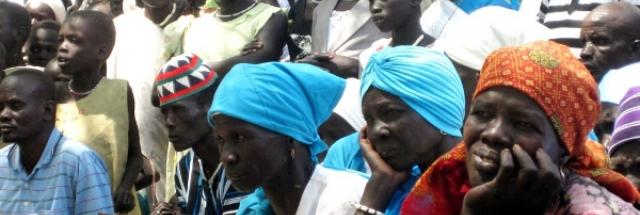Reconciliation in South Sudan - a daunting task
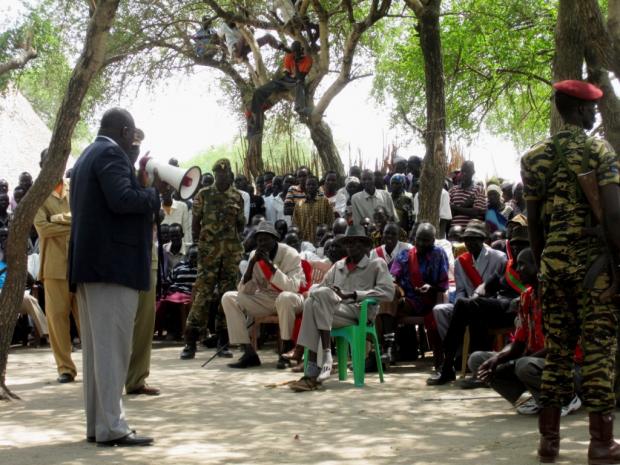 |
Five of us in the IofC advance team arrived last week in South Sudan to join the able group of government officials, members of IofC South Sudan and volunteers to prepare for the launch of national reconciliation. Daily, we have been caught up in the momentum of planning and issues surrounding this campaign.
But a one day journey into Jonglei State last Sunday showed us just what a daunting challenge reconciliation in South Sudan will be.
Two of us from Australia − Nyok Gor and Mike Brown − were invited to join the Vice President, Dr Riek Machar Teny, and others including the Minister of Justice and senior figures from the area, to make a flying visit to a hotspot of conflict where 108 died on 8 February.
We left from the UN compound, strapped into jump seats of three UN helicopters, surrounded by the VPs heavily-armed bodyguard – lithe young men in battle fatigues and smart red berets.
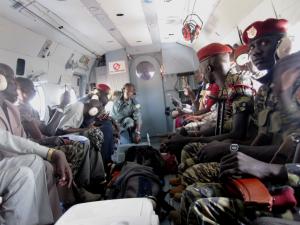 Two hours later, we descended in front of a long line of people from the village and region of Walgak, in western Akobo County. After moving some way along the line greeting elders and the press of people, the Vice President strode off across the parched hardened earth between thatched tukuls (round mud walled huts) to a tree lined area of the village. Three or four thousand people squatted or stood, many in the blazing sun with sweat-beaded brows. Some youths perched in trees. Police waving long canes shouted for people to sit down and be quiet.
Two hours later, we descended in front of a long line of people from the village and region of Walgak, in western Akobo County. After moving some way along the line greeting elders and the press of people, the Vice President strode off across the parched hardened earth between thatched tukuls (round mud walled huts) to a tree lined area of the village. Three or four thousand people squatted or stood, many in the blazing sun with sweat-beaded brows. Some youths perched in trees. Police waving long canes shouted for people to sit down and be quiet.
Using a battery-run loud-hailer, a police official gave the grim facts: a party of villagers on their way to an outlying cattle camp were ambushed at dawn by a militia of the rival Murle people: 94 men, women and children shot dead plus 14 of the government soldiers accompanying them, 23 were injured, 21 still missing.
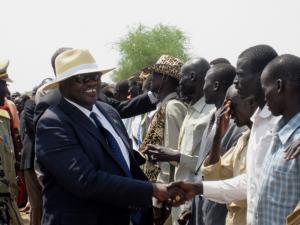 One after the other selected representatives rose to add to the story. An Elder put a case which was repeated by those who followed him: the government had disarmed them last year and now they are defenceless. A youth representative was called forward − a tall young man in an oversized brown suit. He started to speak and broke down, wiping his face with his jacket. Raising his arms he let out a cry to which a resonant deep chant came back from thousands around us, the women ululating. A well-dressed official next to us sobbed uncontrollably. He gave the same story: at last year's peace conference in Jonglei we agreed to surrender our arms. Now we are defenceless.
One after the other selected representatives rose to add to the story. An Elder put a case which was repeated by those who followed him: the government had disarmed them last year and now they are defenceless. A youth representative was called forward − a tall young man in an oversized brown suit. He started to speak and broke down, wiping his face with his jacket. Raising his arms he let out a cry to which a resonant deep chant came back from thousands around us, the women ululating. A well-dressed official next to us sobbed uncontrollably. He gave the same story: at last year's peace conference in Jonglei we agreed to surrender our arms. Now we are defenceless.
Then a woman wearing the blue shawl of a church group spoke passionately. All went silent. Is this the new South Sudan? She asked. You come and take pictures of us to show your children, but our children are dying. We will have to migrate, to go away from this place if you can't protect us.
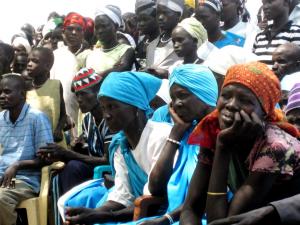 Another Elder, frail but erect, asked: what is the future of South Sudan? We took part in the war, but still our people are being killed.
Another Elder, frail but erect, asked: what is the future of South Sudan? We took part in the war, but still our people are being killed.
The local MP, the Police Chief, the Minister of Justice all made their pleas and promises. Applause and chants of Allelulia rose when the Minister said a new County would be formed with a local administrator in the area. And a murmur of amusement when the Govenor made the Police Chief stand, ordering him not to disarm someone who is peacefully guarding their cattle. ‘Disarmament was not a mistake, he said, ‘but incomplete. It must be finished.’
Then the Vice President’s speech brought a climax, expressing the government's grief that this still happens. ‘As the VP was addressing thousands of villagers in Walgak, I was touched by his message to the youth urging them to go beyond traditions and to learn their neighbours’ dialect so that they can develop positive relationships. He encouraged inter-marriage between the Nuer-lou and Murle, and between Murle and Dinka,’ wrote Nyok afterwards. ‘I thought it was a long-term message of peace among people of Jonglei and South Sudan as a whole.’
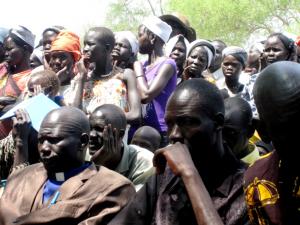 Nyok comments further: ‘After the two-hour meeting, Mike and I quickly walked through Walgak's local hospital and saw children, women and young men with gun wounds. Faced with the reality of seeing these innocent victims of violence and so much grief, I concluded that the journey of healing has a long and rough road ahead that will be travelled by everyone who accepts that change has to start with me. I saw traditional and political leaders, women and youth, using hatred in their speeches. That doesn't encourage peace or new thinking.’
Nyok comments further: ‘After the two-hour meeting, Mike and I quickly walked through Walgak's local hospital and saw children, women and young men with gun wounds. Faced with the reality of seeing these innocent victims of violence and so much grief, I concluded that the journey of healing has a long and rough road ahead that will be travelled by everyone who accepts that change has to start with me. I saw traditional and political leaders, women and youth, using hatred in their speeches. That doesn't encourage peace or new thinking.’
After leaving Walgat, the plan was to fly onto Pibor, stronghold of the Murle people. But as we headed into the helicopter, we heard but the plan had changed and we headed back to Juba. Evidently, politicians in Pibor had left the town, fearing a confrontation. And that the politicians accompanying the VP said they could not go to Pibor because they were grieving for lost family members.
‘I felt that all the leaders that travelled with us were challenged as our fears of the situation overcame the courage to confront the struggle and to bring good news to the people of Pibor that the government cares about you too. How do I talk about reconciliation in South Sudan when there is not security to people of Walgak, Pibor and many other places in South Sudan.’
Nyok J. Achuoth Gor and Mike Brown in Juba, South Sudan
Photos by Mike Brown

